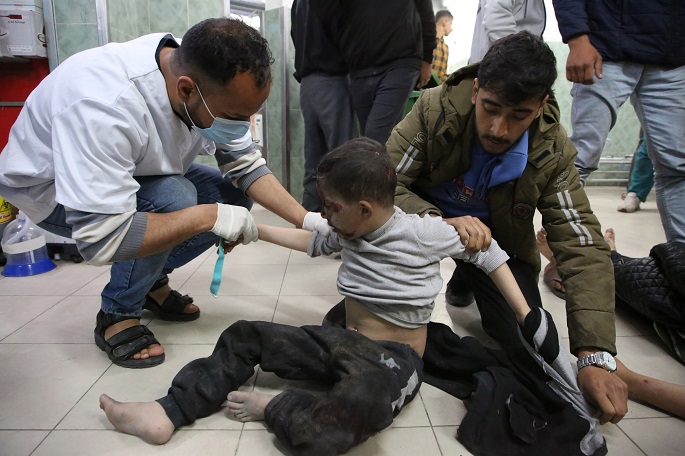UNSC adopts resolution demanding cease-fire in Gaza for Ramadan
Published : 26 Mar 2024, 04:09
The Security Council on Monday adopted a resolution that demands an immediate cease-fire in Gaza for the holy month of Ramadan, reported Xinhua.
The resolution won 14 votes in favor among the 15 members of the council. The United States, which had previously vetoed three draft resolutions that would have called for or demanded a cease-fire in Gaza, abstained on Monday, allowing the draft to pass.
At the adoption of the resolution, there was a round of applause in the chamber, which was a rare occasion.
Resolution 2728 was the first Security Council resolution that demands or calls for a cease-fire in Gaza after the flare-up of the Israeli-Palestinian conflict in Gaza on Oct. 7, 2023. Some 32,333 Palestinians have been killed in Gaza and nearly 75,000 Palestinians injured since Oct. 7, according to the Ministry of Health in Gaza.
Resolution 2728 demands an immediate cease-fire for Ramadan respected by all parties, leading to a lasting sustainable cease-fire.
It also demands the immediate and unconditional release of all hostages, as well as ensuring humanitarian access to address their medical and other humanitarian needs. It further demands that the parties comply with their obligations under international law in relation to all persons they detain.
Resolution 2728 emphasizes the urgent need to expand the flow of humanitarian assistance to and reinforce the protection of civilians in the entire Gaza Strip. It reiterates the Security Council's demand for the lifting of all barriers to the provision of humanitarian assistance at scale, in line with international humanitarian law as well as Security Council Resolutions 2712 and 2720 concerning humanitarian delivery in Gaza.
Before the vote on the draft resolution tabled by the 10 elected members of the Security Council, Russia proposed an oral amendment.
The Russian proposal would have restored the word "permanent" contained in the original draft to demand a Ramadan cease-fire that would lead to a permanent and sustainable cease-fire.
The Russian amendment failed to obtain enough support in the Security Council. The United States voted against the Russian amendment. Eleven members abstained. Three voted in favor.
Immediately after the adoption of the resolution, UN Secretary-General Antonio Guterres called for its implementation.
"The Security Council just approved a long-awaited resolution on Gaza, demanding an immediate cease-fire, and the immediate and unconditional release of all hostages. This resolution must be implemented. Failure would be unforgivable," Guterres said in a post on X, formerly known as Twitter.
In a joint statement, the 10 elected members of the Security Council expressed the hope that Resolution 2728 will be implemented in good faith, by all parties, and will help ease the suffering of the population in Gaza.
In her explanation of vote, the U.S. permanent representative to the United Nations, Linda Thomas-Greenfield, said the resolution was "nonbinding." She also said, "It was important for the Council to speak out and make clear that any cease-fire must come with the release of all hostages."
The U.S. ambassador's remarks sparked controversy.
Guterres' deputy spokesman Farhan Haq said UN Security Council resolutions are legally binding.
"As I've always been told, all the resolutions of the Security Council are international law. So to that extent, they are as binding as international law is."
Ultimately, the implementation of a Security Council resolution is a question of international will. It is up to the will of the parties that are called on to act. But it is also contingent upon the will of the members of the Security Council to ensure that the things that they call for are followed up on, said Haq.
Mozambique's UN ambassador Pedro Comissario Afonso, who spoke to reporters after the adoption of the resolution, said that under the UN Charter, all Security Council resolutions are binding and that all UN member states are under the obligation to implement those resolutions.
"I have been a member of the International Law Commission for 15 years and president (of the commission). And I know what I'm saying," he said.
Sierra Leone's UN ambassador Michael Imran Kanu also confirmed that all Security Council resolutions are binding as was determined in an advisory opinion of the International Court of Justice in 1971.
"I think it should be clear to everyone that this resolution is binding on the parties," he said.
The Republic of Korea's UN ambassador Hwang Joon-kook said Resolution 2728 may not be "legally" binding as it did not use the word "decide" and did not invoke Chapter VII of the UN Charter. However, the resolution should be implemented as it reflects the consensus of the international community, he said.
Zhang Jun, China's permanent representative to the United Nations, called for the implementation of the resolution.
"Security Council resolutions are binding. We call on the parties concerned to fulfill their obligations under the UN Charter and to take due action as required by the resolution," he said. "We expect the states with significant influence to play a positive role on the parties concerned, including by using all necessary and effective means at their disposal to support the implementation of the resolution."
The Security Council must continue to follow closely the situation in Gaza and get ready for further action when necessary to ensure the timely and full implementation of the resolution, said Zhang in an explanation of vote.


